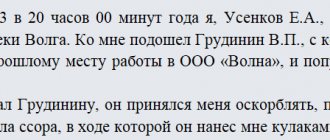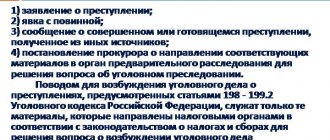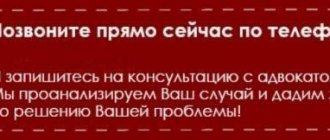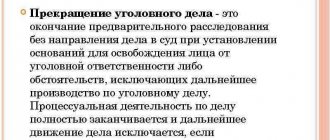New edition of Art. 147 Code of Criminal Procedure of the Russian Federation
1. Criminal cases for crimes specified in part two of Article 20 of this Code shall be initiated only upon the application of the victim or his legal representative:
1) in relation to a specific person - in the manner established by parts one and two of Article 318 of this Code;
2) in relation to the person specified in Article 447 of this Code - in the manner established by Article 448 of this Code.
2. If an application is filed in relation to a person whose details are not known to the victim, then the magistrate refuses to accept the application for his proceedings and forwards the said application to the head of the investigative body or the head of the inquiry body to decide on the initiation of a criminal case, of which the person is notified. who submitted the application.
3. Criminal cases regarding the crimes specified in part three of Article 20 of this Code are initiated only at the request of the victim or his legal representative. Proceedings in such criminal cases are conducted in accordance with the general procedure.
4. The head of the investigative body, the investigator, as well as the inquirer, with the consent of the prosecutor, initiate a criminal case for any crime specified in parts two and three of Article 20 of this Code, and in the absence of a statement from the victim or his legal representative in the cases provided for in part four of Article 20 of this Code Code.
Commentary on Article 147 of the Code of Criminal Procedure of the Russian Federation
1. The commented article contains the features of initiating criminal cases of private and private-public prosecution. Criminal cases of private prosecution include cases that are initiated only at the request of the victim and in the event of reconciliation between the victim and the accused are subject to mandatory termination; to criminal cases of private-public prosecution - cases that are initiated only at the request of the victim, but are not subject to termination in connection with the reconciliation of the victim with the accused, with the exception of cases provided for in Art. 25 Code of Criminal Procedure of the Russian Federation.
2. Part 1 of the commented article establishes the procedure for initiating a criminal case of private prosecution against a specific person. As a general rule, criminal cases of private prosecution are initiated by filing an application by the victim or his legal representative. At the same time, in relation to persons for whom a special procedure for criminal proceedings is provided (Article 447 of the Code of Criminal Procedure of the Russian Federation), criminal cases are initiated in the manner established by Art. 448 of the Code. This procedure provides additional guarantees against unlawful and unjustified criminal prosecution of persons performing important state or public functions.
3. Part 2 of the commented article establishes a procedure obliging the initiation of criminal cases of private prosecution not only against a specific person, but also upon the commission of a crime. The magistrate accepts the application and personally forwards it to the head of the investigative body or the head of the inquiry body in compliance with the rules on jurisdiction. At the same time, the magistrate does not prejudge the issue of initiating a criminal case. Such a criminal case is initiated and investigated in accordance with the general procedure.
3. From the content of part 3 of the commented article it follows that for criminal cases of private-public prosecution, the procedural features of the preliminary investigation are not established by law, although for their initiation the statement of the victim is a prerequisite.
4. The rule enshrined in Part 4 of the commented article allows the investigator, as well as the interrogating officer, with the consent of the prosecutor, to initiate criminal cases of private and private-public prosecution in cases where the victim or his legal representative did not file a statement, if the crime was committed against a person who is in a dependent or helpless state or for other reasons cannot defend their rights and legitimate interests. Since in a number of cases the victim is not able to independently detect the person who committed the crime, situations where a person cannot protect his rights and legitimate interests include, among others, the case of a crime being committed by a person whose details are unknown at the time of initiation of a criminal case.
Everything about criminal cases
Go to the text of the Code of Criminal Procedure
Url Additional information:
I). Initiation of private prosecution cases
- part 1 147 of the Code of Criminal Procedure
shall not be initiated except at the request of the victim:
- Clause 1 Part 1 147 Code of Criminal Procedure
for ordinary citizens in the manner established by
318 Code of Criminal Procedure
- clause 2, part 1 147 Code of Criminal Procedure
initiation of special cases in accordance with Article
448 of the Code of Criminal Procedure
If information about the criminal is unknown
- Part 2 147 Code of Criminal Procedure
If the victim does not have information, the magistrate:
- Part 2 147 Code of Criminal Procedure
refuses to accept the application
- Part 2 147 Code of Criminal Procedure
sends an application to resolve the issue of initiating
- Part 2 147 Code of Criminal Procedure
notifies the applicant
II). Initiation of private-public prosecution cases
- Part 3 147 Code of Criminal Procedure
shall not be initiated except at the request of the victim:
- Part 3 147 Code of Criminal Procedure
private-public proceedings are carried out in accordance with the general procedure
- Part 4 147 Code of Criminal Procedure
initiation of private prosecution without a statement from the victim
Article 147 of the Code of Criminal Procedure. Initiation of a criminal case of private and private-public prosecution
Url Additional information:
- part 1 318 of the Code of Criminal Procedure
initiation of private prosecution cases
- paragraph 27
Plenum No. 17 of private prosecution cases in the magistrate's court
1) Criminal cases for crimes specified in Part 2 20 of the Code of Criminal Procedure are initiated only at the request of the victim or his legal representative:
Url Additional information:
— clause 2
Plenum No. 1 appeal against a specific person
1). in relation to a specific person - in the manner established by part 1 and part 2 of 318 Code of Criminal Procedure;
Url Additional information:
— paragraph 29
Plenum No. 17 filing an application to the magistrates' court for special subjects
2). in relation to the person specified in Article 447 of the Code of Criminal Procedure - in the manner established by 448 of the Code of Criminal Procedure.
Url Additional information:
If there is no information about the criminal
- Part 4 20 Code of Criminal Procedure
if information about the criminal is not known, a case is initiated
- Part 1.1 319 Code of Criminal Procedure
if there is no information about the criminal, the materials are transferred to the police
— paragraph 29
Plenum No. 17 lack of information from the victim about the perpetrator
- paragraph 14
order of the Investigative Committee No. 72 if the person in the private prosecution case is not known
2) If the application is filed in relation to a person whose details are not known to the victim, then the magistrate:
- refuses to accept the application for its proceedings,
- and sends the said application to the head of the investigative
body or the head of the inquiry body to resolve the issue of initiating a criminal case,
which is notified by the person who filed the application.
Url Additional information:
- Part 3 20 Code of Criminal Procedure
initiated only at the request of the victim
3) Criminal cases for crimes specified in Part 3 20 of the Code of Criminal Procedure are initiated only at the request of
the victim or his legal representative.
Url Additional information:
- P.
Plenum No. 41 features of termination of certain categories of cases
Proceedings in such criminal cases are conducted in accordance with the general procedure.
4) The head of the investigative body, the investigator, as well as the investigator, with the consent of the prosecutor, initiate a criminal case
for any crime specified in Part 2 and Part 3 of 20 Code of Criminal Procedure and in the absence of a statement from the victim or his legal representative in cases provided for in Part 4 of 20 Code of Criminal Procedure .
Return to the text of the Code of Criminal Procedure
Seek advice
Guarantee of subjects' rights
In Art. 75 of the Code of Criminal Procedure of the Russian Federation provides an open list of situations when materials and information received by officials must be recognized as having no legal force. In particular, such testimony is considered to be the testimony of the accused/suspect, which was given by him in the absence of a defense lawyer, and was also not confirmed at the hearing of the case. This provision of Art. 75 of the Code of Criminal Procedure of the Russian Federation acts as the most important guarantee against self-incrimination of the subject and his admission of guilt under the influence of mental pressure or physical violence. It is necessary to note that the condition on the absence of a defense lawyer also includes the refusal of the suspect/accused himself. This prevents unlawful actions by officials. In particular, they may manifest themselves in a formally voluntary reluctance to exercise the right to a defense lawyer. In such situations, on the contrary, it is, as a rule, forced.
Other violations
The norm in question also establishes that evidence obtained in other cases of non-compliance with the provisions of the Code is considered inadmissible. Many believe that any violation of procedural law, that is, deviation from any prescription present in the norms, leads to the loss of legal force for the information received. Meanwhile, it should be taken into account that the article in question refers to non-compliance with the Code as a whole, but not with its individual provisions. If the legislation provides for ways and means by which it is possible to neutralize the consequences that have occurred, if they are applied correctly, it will not be possible to say that materials and information were obtained unlawfully and therefore cannot be accepted. As judicial practice shows under Art. 75 of the Code of Criminal Procedure of the Russian Federation, failure to warn a witness that he has the right not to testify against himself or relatives is a significant violation of existing procedural norms. But if it is established, including with the help of the subject’s own explanations, that this did not affect the integrity of the information provided by him, they can be considered to have legal force. At the same time, no rules can eliminate the violation associated with obtaining a confession from the accused through cruel treatment, torture, or degrading actions. Or in another case, for example, a search was carried out with witnesses. It later turned out that they were interrogators. In accordance with the norms, only disinterested subjects can be understood. Thus, doubts arise about the objectivity of the search and the reliability of the results that were obtained.
Article 75 of the Code of Criminal Procedure of the Russian Federation: inadmissible evidence (clarifications)
Materials and information obtained by officials during the investigation must comply with established legal requirements. This means that they must have proper procedural form. Deviation from it leads to insignificance of information. This is confirmed by judicial practice under Article 75 of the Code of Criminal Procedure of the Russian Federation. Inadmissible evidence becomes inadmissible when the provisions of the Code are violated. However, in accordance with the Constitution, it is prohibited to use information and materials obtained in violation of the requirements of federal law. In this situation, there is a conflict of norms. In this case, constitutional provisions take precedence. In this regard, according to experts, the interpretation of Art. 75 of the Code of Criminal Procedure of the Russian Federation needs to be expanded. Otherwise, materials received, for example, with violations during operational-search activities, but properly executed, could be taken into account during the proceedings.
Unconfirmed information
They include information provided on the basis of guesses, rumors, assumptions, as well as information the source of which the subject cannot name. The inclusion of this provision in Art. 75 of the Code of Criminal Procedure of the Russian Federation is determined by the fact that verification of such information is extremely difficult. In addition, the investigation uses specific facts that are directly related to the event. All this applies to the testimony of a witness. As for victims, this provision does not apply to them. It is probably assumed that the victim himself acts as the primary source of information about the crime, and therefore is unlikely to testify based on hearsay.
Basic provisions
In part 2 art. 75 of the Code of Criminal Procedure of the Russian Federation defines the types of violations as a result of which the information and materials received are not accepted for consideration. In particular, the testimony of the accused/suspects, which is given during the investigation in the absence of a defense lawyer, including in case of refusal, will not have legal force, if they are not confirmed by the subject during the trial of the case. According to Part 2 of Art. 75 of the Code of Criminal Procedure of the Russian Federation, information received from witnesses/victims based on guesses, rumors, and assumptions is not taken into account. The testimony of subjects who cannot name the source of knowledge is also invalid. Other materials and information obtained in violation of the provisions of the Code are not taken into account.
Example
Operational officers carried out a test purchase of a narcotic substance with further penetration into the residential premises against the will of the persons staying in it, without obtaining prior permission from the authorized body. If the prohibited drug obtained and the money found on the seller are inspected in compliance with procedural requirements, then within the meaning of Art. 75 of the Code of Criminal Procedure of the Russian Federation, they have legal force as materials confirming the guilt of the subject. Formally, therefore, the provisions of the Code were not violated. Nevertheless, these actions contradict the Federal Law regulating operational investigative work and the Constitution. Accordingly, the evidence obtained cannot be considered admissible. Otherwise, there is a substitution of operational investigative actions for procedural measures for the illegal acquisition of materials necessary for the prosecution.





